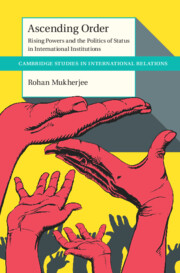‘In a world in transition, Rohan Mukherjee helps us understand when rising powers are likely to challenge the world order or cooperate. In this path-breaking book, Mukherjee shows that the answer lies in overlooked areas - their place and status in international institutions - and the psychology of identity.’
Deborah Welch Larson - co-author of Quest for Status: Chinese and Russian Foreign Policy
‘Ascending Order makes a real contribution to the literature on great power politics and the ways in which we can use institutions to shape the behavior of rising nations. Mukherjee’s analysis is clear and compelling, readily accessible for both scholars and practitioners. A timely and valuable read.’
Anne-Marie Slaughter - CEO, New America
‘Ascending Order is a timely and important contribution to international relations scholarship. Rohan Mukherjee moulds research on status concerns, rising powers, and international institutions into a novel theory that opens a new window on crucial but still poorly understood dimensions of great power politics. If you want to understand the substance underlying much of the talk about the ‘rules based order’ and ‘great power competition,’ read this book.’
William C. Wohlforth - Daniel Webster Professor, Department of Government, Dartmouth College
'The most dangerous moments in international affairs occur when rising states emerge to challenge the dominance of a reigning great power. In this excellent study, Mukherjee shows that these power transitions do not inevitably culminate in great-power conflict or hegemonic war.'
G. John Ikenberry
Source: Foreign Affairs
‘It is a theoretically ambitious and empirically jam-packed contribution that explains why rising powers in global politics sometimes challenge an international order that enables their growth, and at other times support an order that constrains them. The biggest strength of this book is indeed the breadth, depth, and novelty of the archival material, undoubtedly completed through extensive and meticulous labour.’
Caroline Dunton
Source: Small States & Territories
‘Mukherjee provides helpful insights for nation-states and international organizations on how different institutional decisions can shape the behaviour of rising powers. In addition, the book will be of great value to researchers and practitioners as a starting-point for future research on the changing global order.’
Tobias Scholz
Source: International Affairs
‘This book is an important work of both theory and historical analysis that hopefully will have a significant impact on current debates about the rise of China and the fate of the LIO. … Ascending Order has the potential to spark a deeper debate about the rise of China and the future of international order; a debate that is informed more by notions of justice, fairness, and legitimacy than by security concerns and the balance of military power.’
John G. Oates
Source: Ethics & International Affairs
'Mukherjee provides an important analysis of how status and symbolic equality impact international relations. … Highly recommended.’
M. F. Cairo
Source: Choice
‘… an outstanding book … Together with Mukherjee’s cogent writing style, the book’s timeliness and its contributions to the literatures on status, hierarchy, revisionism, and global governance make Ascending Order a must-read for otherwise disparate audiences.’
Source: Review of International Organisations





